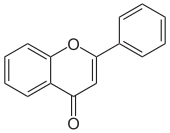Flavonoids are a class of phenolic compounds widely
distributed in plants. Quercetin and rutin are among the most largely found
flavonoids in a great variety of fruits and vegetables, including tea, coffee,
and other grains. As it has been observed with other biological active
nonnutrient components, flavonoids may promote desirable and nondesirable
physiological effects in humans.
Flavonoids are a
group of plant metabolites thought to provide health benefits through cell
signalling pathways and antioxidant effects. These molecules are found in a
variety of fruits and vegetables. Flavonoids are polyphenolic molecules
containing 15 carbon atoms and are soluble in water. They consist of two
benzene rings connected by a short three carbon chain. Flavonoids are abundant in plants, in which
they perform several functions. They are essential pigments for producing the
colors needed to attract pollinating insects. In higher order plants, flavonoids
are also required for UV filtration, nitrogen fixation, cell cycle inhibition,
and as chemical messengers. Health
benefits to humans
Flavonoids are important antioxidants, and promote several
health effects. Flavonoids are also abundant in red wine.

No comments:
Post a Comment